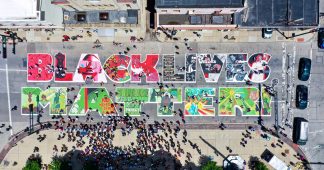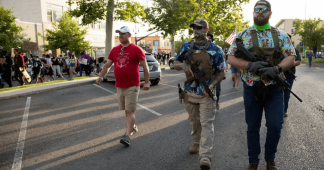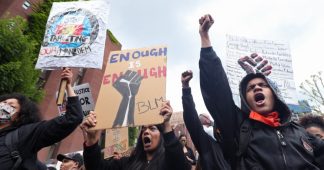A man calling himself Grandmaster Jay has raised a disciplined, heavily armed militia. It has yet to fire a shot at its enemies, but it’s prepared for war.
by Graeme Wood
Photographs by Mark Peterson / Redux
The NFAC leader’s real name is John Fitzgerald Johnson. He is a former soldier, a failed political candidate, a hip-hop DJ, a rambling egotist, and a prolific self-promoter. His life sometimes seems like a long disinformation campaign about itself. The alternate versions of Jay do not seem to cohere into a single person. “I’ve lived five different lives,” he told me, enigmatically. “Like a Rubik’s Cube.”
“We’re not going to dig into who I am,” he said. “You won’t get that from me.” He said he wasn’t from the Midwest. But I knew he lived near Cincinnati: I had staked out his apartment that afternoon. Even facts as straightforward as his age are not simple to determine. Some sources say he is as young as 50, others as old as 59. He is lithe enough to pass for being in his mid-40s. The best evidence—including court records—suggests that he turned 57 in December. (That might explain his given name: He would have been born just nine days after the assassination of John Fitzgerald Kennedy.) One hint that he is no longer a young man is a light smattering of age spots across his nose.
In Louisville, just two hours from where Jay and I sat, the NFAC first revealed the extent of its capabilities. On his YouTube channel, Jay posted a video of his troops in formation, and local news stations ran aerial shots. The men and women are ragtag and amateur, and their uniforms are not, well, uniform. One man has a Texas-flag patch Velcroed to his body armor; a woman taps the trigger guard of her AR-15 with a three-inch yellow fingernail. But my goodness, the weaponry—AR-15s galore, sniper rifles with scopes and bipods, high-capacity magazines, and enough “tactical” clothing to resupply an Army-surplus store. They look like World War II partisans meeting their clandestine commander for the first time. They stand in neat, spaced columns. I counted 28 rows of seven before I stopped counting. (By contrast, aerial photos suggest that the white militiamen present that day could have fit in a small school bus.) When Jay orders his people into motion, they go.


So far, that is all they do. They do not bicker with other protesters, carry signs, or explain themselves. “We don’t come to sing,” Jay told a reporter from Newsweek. “We don’t come to chant.” Instead they stand, like a praetorian guard for some unseen emperor. In this laconic way, they distinguish themselves from two groups they loathe or deride: white militias (the camo-bedecked guys who show up at the same demonstrations and, sometimes, at the behest of the president, try to topple American democracy) and Black Lives Matter, whose activists tend toward nonviolence. “That movement accomplished nothing,” Jay told me, just “a lot of singing, a lot of hand-holding, a lot of sentiments and praise.”
One objection to such a militia is that it is avowedly racist. Jay described its recruiting strategy: “You must be Black,” he said. “If you’re biracial, your father must be Black.” The other criteria relate to recruits’ ability to arm themselves without attracting the attention of law enforcement. “Military experience is preferred,” Jay said, and would-be coalition members must have their own AR-style rifle. “We’re not a shotgun organization.” Anyone without a concealed-carry permit must have the clean record necessary to get one. In one of Jay’s videos, he tells his followers that he intends to meet “each and every last one of you face-to-face,” to conduct an interrogation to “screen out fakes, wannabes, snakes, and spiders.” Jay says he will swear people in after they have “put your life on the line” by standing armed in an NFAC formation, in a situation where other armed groups might start trouble.
“These are volatile situations,” Amy Iandiorio, an investigative researcher for the Anti-Defamation League’s Center on Extremism, told me when I asked her about the NFAC. The coalition is “larger than the older [white] militias. They are a lightning rod that attracts opposing groups, and that’s a recipe for conflict.”
“We have a zero-incident record,” Jay boasted, mostly accurately. “We’ve never destroyed a piece of property, or had our people arrested for anything.” So far, the NFAC’s only known casualties have been its own members, after a woman in formation sent herself and two others to the hospital when she fired her weapon seemingly by accident. (Right-wingers, gun enthusiasts, and ex-military types on social media ridicule Jay for his and his followers’ poor weapons discipline.)
Jay’s own record is blemished with accusations of violence (he denies them), and amid his long sermons about “racial maturity” and spiritual self-awareness, he sometimes makes alarming threats. In one video, as alleged in a criminal complaint against him, he tells his followers to burn government officials’ homes and murder their children. He also advises them to destroy police body cameras if they assault cops, to remove evidence.
In early December, the FBI raided his apartment and arrested him on charges that, during a September demonstration in Louisville, he pointed a rifle at federal agents, blinding them with its mounted light. Jay told me that all the allegations against him are “bullshit.” By bringing them up, federal prosecutors are trying to “character assassinate” him. “I’m a student of history,” he said. “Anytime someone starts to galvanize people, it’s the same process”: character assassination, then financial assassination through mounting legal bills, then imprisonment, exile, or outright murder. Jay is now out on bail. His social-media accounts are frozen, and he faces a possible 20-year sentence—which may or may not be a deterrent, if he thinks his end is near anyway.
The filtered water must have lowered his inhibitions, because over the next two hours Jay became more garrulous. His story, and the purpose of Not Fucking Around, became a little more clear, and a little less.
He grew up in Richmond, Virginia, and New York City. According to Pentagon records, he joined the military in 1989. At some point he got married, though he refused to say more about his domestic life. He told me that he spent four years in the Army in Germany, where he revised his racial self-understanding. “I saw that I had been socialized to believe that I was second-class, that there was something criminal inherent about me,” he said. In Germany, Jay was “treated with the utmost respect,” and he said he enjoyed a reprieve from the American racial hierarchy. When he met Americans overseas, they tended to interact with one another more as compatriots in exile than as the race enemies they might have been at home.
He visited Auschwitz, he said, and was indelibly influenced by what he saw. In our conversation, though, he made no direct reference to the mass murder of Jews and others, or to the lessons of totalitarian fascism. Instead, he mentioned that he was impressed by postwar Germany’s decision to outlaw Holocaust denial and the glorification of Nazism. The United States, he thinks, has failed to show the same backbone in reckoning with its crimes against Black people. He considers Germany’s “a genuine effort by society to restore and repair those people who were the victims of this Holocaust.”
Jay’s videos repeat several themes popular among anti-Semitic segments of the Black Hebrew Israelites, a religious movement known for noisy proselytizing and elaborate conspiracy theories. One way to understand the NFAC is to imagine what a paramilitary wing of the Black Hebrew Israelites would be like. (Jay denied all charges of anti-Semitism but refused to answer when I asked directly whether he thought Jews died in large numbers in the Holocaust. “I’ve visited the death camps. I’ve studied the documents. I’ve seen for myself,” he said. “I don’t have to justify my experiences in my position to anyone.”)
Jay’s military career, like most things about him, is strange. After basic training, the Army assigns every soldier a military occupational specialty, or MOS: 11B is an infantryman, 94S is a Patriot system repairer, 12K is a plumber. Most soldiers have just one MOS over the course of their career; once the Army trains a soldier, why go through the expense of training him again? “I had five MOSs,” Jay said. This is like majoring in five different subjects in college—not technically against the rules, but rare and implausible. He named four but refused to identify the fifth. Later, Jay said he had only two MOSs.
In August 2003, according to the affidavit, Jay entered Fort Bragg and “threatened to kill his wife” (who was also a soldier) and her platoon sergeant at a recognition ceremony. Somehow, after all of this, Jay reenlisted that December, this time as an Army reservist. He attained the rank of sergeant, went absent without leave just over a year later, then escaped court martial by getting out of the Army a third time, again under other-than-honorable conditions, and again reduced to private. Despite these travails—or because of them—Jay modeled the NFAC on the military in which he had served. It’s an extremely top-down, chain-of-command organization, perfect for people who like to take orders, or give them. The NFAC is this private’s chance to be a general.
After his final discharge, Jay disappeared for several years. He later claimed to have worked as the “director of a global cloud-integration practice and solutions architect.” He tried a career as a hip-hop DJ, which took an embarrassing turn when stars including Grandmaster Flash and DJ Jazzy Jeff accused him of plagiarism and résumé exaggeration. Jay said the accusations were a misunderstanding, but he also suggested to me, in a peculiar and indirect way, that he had made certain mistakes. “When they finally admit that we have the capability to time travel,” he said, “I would love to see one of us go back and meet ourselves five years ago, or 10 years ago. You would sit that person down and have a word with him.”

Jay reappeared in 2015 as an ally of the movement he now denigrates, Black Lives Matter. “I was caught up in all that—I, too, was waving signs and chanting,” he said. He showed up during uprisings following various outrages, such as the murder of nine parishioners at Emanuel AME Church in Charleston, South Carolina, by a white supremacist. He led a crowd of tens of thousands across the Arthur Ravenel Bridge to protest the mass shooting. After the murder of Walter Scott by a North Charleston police officer, he appeared at the side of Scott’s family. “I was there to escort Walter Scott’s mother into the funeral.” He said he was an ordained minister at the time. Photos from the funeral show Jay wearing an Anglican-style clerical collar and holding Judy Scott’s left arm. (At some point, he repudiated the “Black Lives Matter” slogan. “It’s not Black lives that matter anymore,” he tells a crowd in an undated video. “All lives!”)
The only way to win was to play a different game. On August 21, 2017, he witnessed the total eclipse of the sun while standing outside the city hall of Carbondale, Illinois. He swooned during the eclipse, felt a wave of energy, and began preaching the ideas of the NFAC soon after. He said that the NFAC “was born out of the atmosphere created by Donald Trump,” not out of a spiritual revelation. But the transformation does not appear coincidental. From that point on, he was “spitting knowledge” on social media, much of it about alien spacecraft (“visitors”) and odd phenomena he noticed in the sky. He also said he had a health scare. “I was supposed to be dead two years ago,” he told his followers. “But I’m not. I’m still here because I was cured in a way that defies medicine and changed my entire brain structure.” He began eating differently, and drinking “alkaline water” to “reactivate” his pineal gland and scrub his system of impurities that were impeding “higher abilities.” His drink order—San Pellegrino or filtered tap water—had spiritual implications.
Tommie Shelby, a professor of African American studies and philosophy at Harvard, noted that these ideas have precursors in Black political thought. Armed self-defense has been around at least since Cyril Briggs, who founded the African Blood Brotherhood in 1919. During the period after the First World War, when white mobs were shooting Black people and burning their businesses, many Black people considered peaceful protests (such as those organized by the NAACP) inadequate. Four decades later, the activist Robert F. Williams wrote the classic text of Black armed resistance, Negroes With Guns, which argues that violence against Black people calls for violence by Black people. The tradition of armed resistance persisted even as the civil-rights movement succeeded by rejecting this fearful symmetry: Martin Luther King Jr., Bayard Rustin, and John Lewis showed that Black people without guns were much more formidable.
Jay said he does not admire or imitate any Black activists from previous generations—he protested when I suggested a comparison to the Black Panthers, whose aesthetic the NFAC has obviously ripped off—but was quick to defend the Jamaican political thinker and activist Marcus Garvey, who called for Black self-sufficiency and attempted to found a homeland for Black people. When I mentioned W. E. B. Du Bois, Jay cut me off to condemn Du Bois as a “bourgeois” and “an enemy to the movement Marcus Garvey started … If [Du Bois] was alive today, he would eat his words.”

The United Black Kemetic Nation, he said, would have the full recognition of international law. “What we’re talking [about] here is a legal action that takes us from being freed slaves and descendants of slaves in a country that classifies us by color and denigrates us by race to a place where we are citizens of our own country,” he said. The location of this new country is negotiable, and as a model he considered Wyoming, because of its cheap land. But Jay told me that when he floated Wyoming to his followers, their response was: “Hell no—nobody wants to go to Wyoming.” (Shelby notes that the desire to establish a Black homeland on American territory likewise has a long history, showing up in Harry Haywood’s book Negro Liberation in the 1940s and the Republic of New Afrika movement in the ’60s and ’70s.)
To demonstrate its power, Jay said, the NFAC aims to assemble, in one place, “a million legal [Black] gun owners,” to show that the United Black Kemetic Nation can defend itself. Part of the process of creating a new country (under a treaty known as the Montevideo Convention) is demonstrating that enough people are eager to live there permanently and can administer the new state. That includes defending it. Jay said, “If I assemble 1 million legal guns, I have the fifth-largest ground army on the planet. I think that’s a pretty significant indication … There are 57 million of us here. All I want is 1 [million].” (According to the Census Bureau, 47 million Americans identify as Black or Black and another race. Because of Jay’s patrilineal theory of race, he would presumably recognize a smaller number still.)
How can you get even 1 million armed followers if just a few years ago you were a failed DJ and now you believe that San Pellegrino will give you preternatural mental powers? These do not sound like promising beginnings for a modern Simón Bolívar or Toussaint L’Ouverture.
The NFAC also appears to have tapped into a kind of modish authoritarian magical thinking. Plenty of Trump supporters believed that their man had a mystical ability to outwit his opponents and bend previously unbendable laws of politics. He could say anything, do anything, and somehow survive. (Many still believe this.) In Jay, NFAC followers have a leader who conjured an army ex nihilo, announced a Black uprising in multiple American cities, and somehow got away with it for months. (I wonder how many of them regard Jay’s fraudulent past the way Trump supporters regard the former president’s—i.e., if such a clown could get this far, he must have divine favor.) Jay has terrible ideas, and in ordinary circumstances most people would identify them as crazy and reject them. In 2020 and its aftermath, however, there is a greater-than-usual demand for someone who seems to have at least a little skill at propitiating the angry gods.
“You mentioned time travel and you mentioned alien spacecraft,” I said. “Do you know anything about these things?”
Jay paused. “I’m not at liberty to discuss those.” I asked if he felt obliged to oaths of secrecy sworn to the U.S. military that had twice expelled him from its ranks. He said yes, but I pressed him to continue.
“Very interesting,” Jay said, speaking slowly and deliberately for the first time since his performance that night had begun. “Someone asked me the other day, they said, ‘How is it that you’ve managed to do in six months what other people have not been able to do for 60 years?’ … I would simply say that knowing the future doesn’t help. Unless you have a deep, personal, hands-on experience with the past.”
“A lot of times when people talk about time travel, they always run into the paradigm ‘If you change something in the past, then you’ll screw up your present.’” Jay shook his head. “Think of it in terms of alternate paths.” He said that by “stepping off this timeline into another timeline,” you create a new reality. “Yes, you can screw up things in that timeline. But when you return to your timeline, nothing has changed!” He continued. “There is no set future. There are multiple futures depending on the timeline that you set in motion.” He said one cannot really change the past—just mint a new timeline.
I thanked Jay for his time, and he thanked me for mine. A month later, the police raided his apartment. Among the small armory of assault rifles, they also found a prodigious amount of marijuana.

After Jay’s arrest in December, he ordered his followers into a “stand-down position.” The militias that the NFAC opposes, such as the Oath Keepers, were active during December and January—and because of their presence at the storming of the Capitol, they now feel the heat of law enforcement. On January 6, the NFAC had no presence in Washington: The District of Columbia does not allow open carry of weapons. When I talked with him in February, Jay gloated about his enemies’ legal jeopardy, with some justification. “The U.S. government is going around cleaning up all of those other organizations,” he said. “We’re watching.” This strategic stand-down was not entirely voluntary, of course. By arresting Jay, the government took him out of circulation as a militia leader. He won’t be able to post instructional videos for some time, because of the social-media ban that was a condition of his bail. The cops took his rifles too.
Jay’s disarming has occasioned a shift in his emphasis, if not tone. When I spoke with him after January 6, he still slipped into periodic fits of rage at the impertinence of my questions, but he stressed that the NFAC is “peaceful” and wants to “open up a dialogue and stabilize the situation.”
But Jay did not raise a militia by cultivating a tranquil persona, and the NFAC members who heeded his call at his craziest moments will not wait forever for him to revoke his stand-down order and recover his insanity. They joined a group that promised to take a bite out of the Earth and reserve it for Black people. They expected to be led by a commander who preaches radical separatism, and who will swagger with an AR-15 in public and boast that his snipers can bisect a white militiaman’s head from 1,000 yards away. Jay told me that he already had to vet his recruits carefully. “Some people come to change the world,” he said, “and some come to end it all.” The latter, he implied, are unwelcome in the NFAC and have to be screened out. The NFAC has room for only one messiah. But even those who originally joined with peaceful intent can become jaded, given enough time, injustice, and absentee leadership.
* Graeme Wood is a staff writer at The Atlantic and the author of The Way of the Strangers: Encounters With the Islamic State.
Published at www.theatlantic.com











